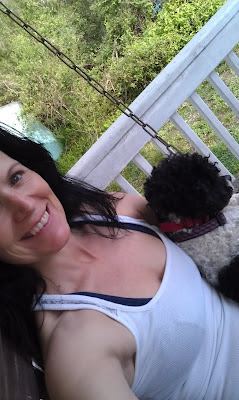 Weight loss tip
Weight loss tip If you want to eat when you should not be hungry, you may be masking thirst with hunger. Drink water first. Wait 15 minutes and see if that diminishes the desire to eat.
You have probably heard those narrators on the National Geographic specials say things like "Water is life." They may sound overly dramatic, but they are right.
Staying hydrated is not rocket science! It may be one of the easiest ways to improve your overall health!
We humans are more than 70% water. We begin to get dehydrated and our performance drops off with as little as a 2% water loss. What can cause a 2% water loss? It does not take much. It can happen to an athlete who is competing, to someone who is in bed with the flu or diarrhea, in very hot weather, or even to someone who just does not drink enough.
No water, no go....
What happens to your body when you’re dehydrated?
• Your brain will not work properly – you’ll be groggy, slow, and feel out of it.
• You will lose muscle tone.
• Your kidneys will not be able to function; toxins and wastes will back up in your body, making you feel generally crummy.
• You will have trouble regulating your body temperature; you may feel overheated, or you may feel chronically cold and unable to get warm.
• You will get constipated.
• Fats stored in your body won’t get used up or metabolized.
• You will think you are hungry all the time, and so you will be likely to eat more than you need to.
• Your skin will get dry, itchy, and saggy.
Most articles you read recommend 8 to 12 glasses of water a day for healthy individuals. If you’re thinking, "That’s A LOT of water," remember this refers to 8 oz glasses! Your 24 oz water bottle equals 3 of your servings. Here are some conditions that may require greatly increasing the amount of water you drink:
• You are exercising.
• The weather is warm.
• You are on a high fiber diet or taking a fiber supplement. (Fiber uses up lots of water.)
• You are trying to lose weight. Some people worry that if they drink too much water they’ll get bloated. This really is not true. Your body only stores as much water as it needs. The rest it dumps out unless you have a health problem that is causing fluid build-up.
• You are in a high altitude area, where the air tends to be drier and evaporation occurs faster.
• You are traveling, especially in airplanes where the same air is re-circulated over and over again, which also may make the air drier.
• You spend most of your time indoors, where there is little fresh air.
• You have an acute illness – like a cold or a bladder infection. Fevers, vomiting, diarrhea all cause you to lose or use up large amounts of water, which needs to be replaced.
Important Tips to remember:
• Drinks with caffeine can be counter productive. They cause you to lose water by increasing your urine output. So, if you use caffeinated drinks, increase your water intake as well. If your fluid intake is restricted to begin with, you may want to avoid entirely, or at least greatly limit, caffeinated beverages. Caffeine is found in coffee, tea, colas, and some other soft drinks.
• Sports drinks and juices do help you replace water, but they contain lots of calories. They are also expensive. If you are not a heavy-duty exerciser, sports drinks really are not necessary. They are no better than plain water. And, if you are watching your weight, they may have far more calories than you want!
• Finally, know that your thirst sensation runs quite a bit slower than your body’s need for water. By the time you realize that you are feeling thirsty, your body will already be suffering from drought. Most experts suggest that you drink before you get thirsty. If you’re exercising; even if you are just pushing a long distance, drink water before, during, and after.
It does take a little effort...
It might not be that easy to develop the habit of getting in 12 glasses of water a day! Here are some suggestions:
• Keep a water bottle with you. Or start the day with a gallon jug and empty it!
• Drink before meals, when you’re hungry, rather than afterwards, when you are already full.
• Try to do most of your drinking in the morning and early afternoon so there is time for all that water to be eliminated before bedtime.
 Don’t waste your drinking efforts on things that won’t help: coffee, many teas, colas, etc. A smaller amount of water will be more advantageous than a larger amount of many other beverages.
Don’t waste your drinking efforts on things that won’t help: coffee, many teas, colas, etc. A smaller amount of water will be more advantageous than a larger amount of many other beverages.
